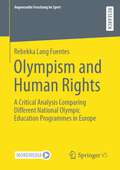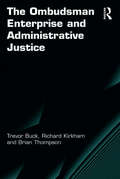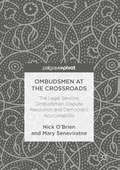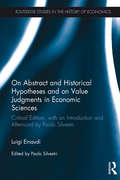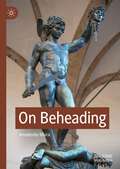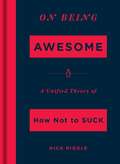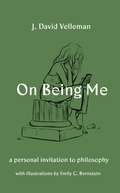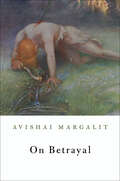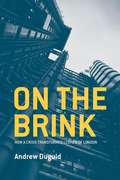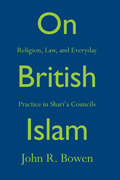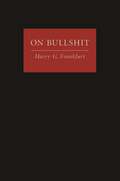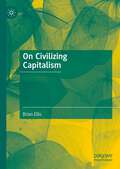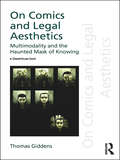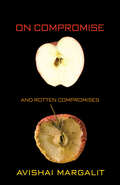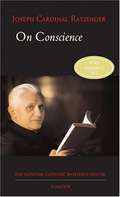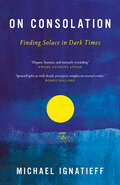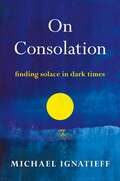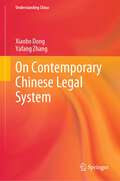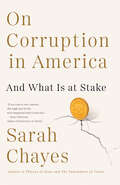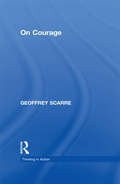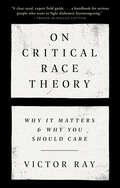- Table View
- List View
Olympism and Human Rights: A Critical Analysis Comparing Different National Olympic Education Programmes in Europe (Angewandte Forschung im Sport)
by Rebekka Lang FuentesOlympic Education is tasked by both Olympism (Olympic Movement’s underlying philosophy) and the United Nations to educate on human rights. This study explores how present this call is in contemporary European Olympic Education. National Olympic Education programmes from twelve countries are examined and compared: Armenia, Austria, Belarus, Croatia, Hungary, Israel, Germany, Lithuania, Portugal, Russia, Slovenia, and Spain. Responses by individuals with NOAs’ leadership positions to a semi-standardized research questionnaire as well as written information by NOAs on implemented national Olympic Education programmes, collected during February-May 2021, are subjected to a content analysis. Results indicate that human rights are explicitly and implicitly included as an educational theme in contemporary Olympic Education programmes. Parallels between human rights education and Olympic Education can be drawn.
The Ombudsman Enterprise and Administrative Justice
by Trevor Buck Richard Kirkham Brian ThompsonThe statutory duty of public service ombudsmen (PSO) is to investigate claims of injustice caused by maladministration in the provision of public services. This book examines the modern role of the ombudsman within the overall emerging system of administrative justice and makes recommendations as to how PSO should optimize their potential within the wider administrative justice context. Recent developments are discussed and long standing questions that have yet to be adequately resolved in the ombudsman community are re-evaluated given broader changes in the administrative justice sector. The work balances theory and empirical research conducted in a number of common law countries. Although there has been much debate within the ombudsman community in recent years aimed at developing and improving the practice of ombudsmanry, this work represents a significant advance on current academic understanding of the discipline.
Ombudsmen at the Crossroads
by Nick O’brien Mary SeneviratneThis book charts the evolution of the Legal Services Ombudsman for England and Wales. Established in 1990, it had a statutory remit that explicitly recognized its dual responsibility for consumer dispute resolution and democratic accountability. It was replaced in 2010 by a very different type of ombudsman institution. The book describes how the Ombudsman reconciled its different roles and how far it succeeded in changing the mentality of the legal profession. The authors relate the Ombudsman's successes and failures to current debates facing the ombudsman and regulatory community, and highlight the continuing potential of the ombudsman institution. The ombudsman institution emerges as a 'third way' between the courts and various forms of alternative dispute resolution, and as a creative and democratic means of responding to public grievance.
Ombudsmen at the Crossroads: The Legal Services Ombudsman, Dispute Resolution and Democratic Accountability
by Nick O'Brien Mary SeneviratneThis book charts the evolution of the Legal Services Ombudsman for England and Wales. Established in 1990, it had a statutory remit that explicitly recognized its dual responsibility for consumer dispute resolution and democratic accountability. It was replaced in 2010 by a very different type of ombudsman institution. The book describes how the Ombudsman reconciled its different roles and how far it succeeded in changing the mentality of the legal profession. The authors relate the Ombudsman’s successes and failures to current debates facing the ombudsman and regulatory community, and highlight the continuing potential of the ombudsman institution. The ombudsman institution emerges as a ‘third way’ between the courts and various forms of alternative dispute resolution, and as a creative and democratic means of responding to public grievance.
On Abstract and Historical Hypotheses and on Value Judgments in Economic Sciences: Critical Edition, with an Introduction and Afterword by Paolo Silvestri (Routledge Studies in the History of Economics)
by Luigi EinaudiLuigi Einaudi (1874-1961) was a leading liberal economist, economic historian and political figure. This book provides the English-speaking world with a first critical edition of Einaudi’s – hitherto unpublished – rewriting of one of his most unique and thoughtful essays. The relevance of this essay is crucial from several perspectives: history and methodology of economic thought, role of economics and its relation to other disciplines and to social values, role of economists in the public sphere, while also encompassing the discourse on man and the economist as a "whole man". The critical edition of On Abstract and Historical Hypotheses and on Value Judgments in Economic Sciences includes a comprehensive introduction and afterword. An extensive reappraisal of this newly discovered essay will help to cast light on Einaudi’s uniqueness and originality within and beyond the Italian tradition in public finance, thereby also illuminating his attempt to provide an epistemological account of his long lasting enquiry into the causes of good and bad polities. This book is of great interest to those who study economic theory and philosophy, as well as history of economic thought, public economics and legal and political philosophy.
On Beheading
by Amalendu MisraBeheading is not an uncommon undertaking. As a particularized physical violence, it has been practiced by all societies and civilizations at some point in their history. In fact, for millennia public beheadings around the world were routine. In contemporary international society some states and many non-state actors regularly engage in this undertaking.This begs the obvious question: why put a human being through this unimaginable cruelty? While the idea of execution by decapitation appears visceral and horrific, it has always been grounded in cultural, religious and political contexts. If contemporary history is any proof, the enterprise of beheading a fellow human being appears to be making a comeback in certain religious and political landscapes.A question of enormous intellectual importance, the phenomenon of beheading is understudied. There have been many explanations surrounding specific forms of beheading through the ages. However, no inclusive study has engaged with it in its entirety.Primarily a philosophical reflection, On Beheading is inter-disciplinary in nature; it freely cuts across various disciplines within the broad framework of the social sciences. It uses a vast array of empirical evidence from anthropology, literature, jurisprudence and religion to build a discourse and narrative that brings this subject under one intellectual umbrella.
On Being Awesome: A Unified Theory of How Not to Suck
by Nick RiggleIn this lively treatise, pro-skater-turned-philosopher Nick Riggle presents a theory of awesomeness (and its opposite, suckiness) that’s both sharply illuminating and more timely than ever “Nick Riggle’s fun book is ‘awesome’ by its own definition. But don’t miss its profound ambition, which is to show how philosophy unearths the structure of ordinary language, defines the meaning of life in routine business, and poses the question of how best to live.” —Aaron James, author of Assholes: A Theory We all know people who are awesome and people who suck, but what do we really mean by these terms? Have you ever been chill or game? Do you rock or rule? If so, then you’re tapped into the ethics of awesomeness. Awesome people excel at creating social openings that encourage expressions of individuality and create community. And if you’re a cheapskate, self-promoter, killjoy, or douchebag, you’re the type of person who shuts social openings down. Put more simply: You suck. From street art to folk singers, Proust to the great etiquette writer Emily Post, President Obama to former Los Angeles Dodger Glenn Burke, Riggle draws on pop culture, politics, history, and sports to explore the origins of awesome, and delves into the nuances of what it means to suck and why it’s so important to strive for awesomeness. An accessible and entertaining lens for navigating the ethics of our time, On Being Awesome provides a new and inspiring framework for understanding ourselves and creating meaningful connections in our everyday lives.
On Being Here to Stay
by Michael AschWhat, other than numbers and power, justifies Canada's assertion of sovereignty and jurisdiction over the country's vast territory? Why should Canada's original inhabitants have to ask for rights to what was their land when non-Aboriginal people first arrived? The question lurks behind every court judgment on Indigenous rights, every demand that treaty obligations be fulfilled, and every land-claims negotiation.Addressing these questions has occupied anthropologist Michael Asch for nearly thirty years. In On Being Here to Stay, Asch retells the story of Canada with a focus on the relationship between First Nations and settlers.Asch proposes a way forward based on respecting the "spirit and intent" of treaties negotiated at the time of Confederation, through which, he argues, First Nations and settlers can establish an ethical way for both communities to be here to stay.
On Being Me: A Personal Invitation to Philosophy
by J. David VellemanA moral philosopher’s meditations on some of life’s most important questionsWe’ve all had to puzzle over such profound matters as birth, death, regret, free will, agency, and love. How might philosophy help us think through these vital concerns? In On Being Me, renowned moral philosopher J. David Velleman presents a concise, accessible, and intimate exploration into subjects that we care deeply about, offering compelling insights into what it means to be human.Each of Velleman’s short, personal chapters begins with a theme: “Being Glad I Was Born,” “Wanting to Go On,” “Fearing the End,” “Regretting What Might Have Been,” “Aspiring to Authorship,” “Making Things Happen,” and “Wanting to Be Loved.” Reflecting on how daily life presents us with thorny riddles that need working out, Velleman arrives at unexpected conclusions about survival and personal identity, the self and its future, time and morality, the rationality of regret, free will and personal efficacy, and goodness and love. He shows that we can rely on our own powers of thought to arrive at a better understanding of the most fundamental parts of ourselves—and that the methods of philosophy can help get us there.Beautifully illustrated by New Yorker contributing artist Emily Bernstein, On Being Me invites us to approach life philosophically.
On Being Rich and Poor
by Willem H. Vanderburg Jacques EllulOne of the most original thinkers of the twentieth century, Jacques Ellul (1912-1994) was a French law professor, sociologist, lay theologian, and self-described "Christian anarchist." Collecting Ellul's lectures on the Bible, On Being Rich and Poor contains his prescient meditations on some of the most important theological questions of the modern age. In this volume, a follow-up to the Ellul lectures collected in On Freedom, Love, and Power, Ellul asks how it is that Christianity can justify abandoning the poorest, weakest, and most vulnerable members of society, depriving the next generation of a liveable future, and participating in an unprecedented wave of environmental destruction.In these talks, Ellul observes that some of the harshest language in the Jewish and Christian Bibles is reserved for those who are rich and powerful, and thus able to bend others to their will. Through his analysis of the prophetic vision of Amos and the epistle of James, Ellul exposes the gap between the principles of Christian life and the practices of the modern world. Critiquing a world that values domination over collaboration, he offers an alternative path.Transcribed from the original recordings and translated by Willem H. Vanderburg, a student and long-time colleague of Ellul's, On Being Rich and Poor is an unprecedented look at how one of the twentieth century's foremost thinkers grappled with some of today's most challenging issues.
On Betrayal
by Avishai Margalit“Seamlessly combines analytic rigor with personal memoir . . . its arguments are drawn from political history . . . Biblical commentary . . . novels and biographies.” (Amélie Rorty, Tufts University)Adultery, treason, and apostasy no longer carry the weight they once did. Yet we constantly see and hear stories of betrayal. Avishai Margalit argues that the tension between the ubiquity of betrayal and the loosening of its hold is a sign of the strain between ethics and morality, between thick and thin human relations. On Betrayal offers a philosophical account of thick human relations?relationships with friends, family, and core communities?through their pathology, betrayal.Judgments of betrayal often shift unreliably. A traitor to one side is a hero to the other. Yet the notion of what it means to betray is remarkably consistent across cultures and eras. Betrayal undermines thick trust, dissolving the glue that holds our most meaningful relationships together. On Betrayal is about ethics: what we owe to the people and groups that give us our sense of belonging.Drawing on literary, historical, and personal sources, Maraglit examines what our thick relationships are and should be and revives the long-discarded notion of fraternity.“Provocative and illuminating.” —Michael Walzer, Institute for Advanced Study“Witty and wise, precise and profound, On Betrayal is an easy but deep read: it sees life as it really is with all its turmoil.” —The Christian Century“The range of Margalit’s examples is astonishing. . . . He is much more knowledgeable about and comfortable with communities (and in communities) than most philosophers are, and so he is very good at recognizing when they go wrong.” —New York Review of Books
On The Brink
by Andrew DuguidThis is the story of how huge losses very nearly destroyed a revered British institution, Lloyd's of London, the world's largest insurance market; how outraged members challenged a complacent institution; and how it changed to confront and overcome its biggest ever crisis. Ten thousand people faced huge personal bills they thought profoundly unfair. They were trapped; there was no escape. The market that insured disasters had become a disaster for its members. The story of Lloyd's is relevant now, raising many contemporary issues: levels of professional competence, trust, negligence, perverse incentives, and responsibilities owed by insiders to outside investors. High rewards contrast sharply with disastrous results. It raises the legitimacy of governing institutions, the right degree and form of self-regulation and the role of government. It illuminates the limits of tolerance, the power of anger, and its limitations. The search for justice shines a light on the workings of the English and US legal systems. Fairness is pitted against commercial expediency. Old attitudes clash with new circumstances. Leadership is critical in building trust and deciding when to compromise. Fresh thinking, new structures and new skills are all needed to find a way to balance the interests of past and future stakeholders. Persuasion has to overcome alternative analysis, misunderstanding, anger and inertia. Engagement of opposing parties proves critical. The issues illustrated by this story arise each day in Britain, the US and elsewhere. On the Brink is a true story of strong characters, changing fortunes, contrasting values, incompetence, real experts, self-help, creative compromise, innovation and change. It is the story of individuals, groups, leaders and the institution, locked in a battle for survival, each slow to see their common interest. To this day, the Lloyd's crisis raises strong emotions among those involved; many myths have grown up. This book tells what really happened, from the inside. A website, www. onthebrink. uk. com, accompanies this book with extra detail for those interested.
On British Islam: Religion, Law, and Everyday Practice in Shariʿa Councils
by John R. BowenOn British Islam examines the history and everyday workings of Islamic institutions in Britain, with a focus on shariʿa councils. These councils concern themselves with religious matters, especially divorce. They have a higher profile in Britain than in other Western nations. Why? Taking a historical and ethnographic look at British Islam, John Bowen examines how Muslims have created distinctive religious institutions in Britain and how shariʿa councils interpret and apply Islamic law in a secular British context.Bowen focuses on three specific shariʿa councils: the oldest and most developed, in London; a Midlands community led by a Sufi saint and barrister; and a Birmingham-based council in which women play a leading role. Bowen shows that each of these councils represents a prolonged, unique experiment in meeting Muslims' needs in a Western country. He also discusses how the councils have become a flash point in British public debates even as they adapt to the English legal environment.On British Islam highlights British Muslims' efforts to create institutions that make sense in both Islamic and British terms. This balancing act is rarely acknowledged in Britain--or elsewhere--but it is urgent that we understand it if we are to build new ways of living together.
On Bullshit
by Harry G. FrankfurtThe #1 New York Times bestseller that explains why bullshit is far more dangerous than lyingOne of the most salient features of our culture is that there is so much bullshit. Everyone knows this. Each of us contributes his share. But we tend to take the situation for granted. Most people are rather confident of their ability to recognize bullshit and to avoid being taken in by it. So the phenomenon has not aroused much deliberate concern. We have no clear understanding of what bullshit is, why there is so much of it, or what functions it serves. And we lack a conscientiously developed appreciation of what it means to us. In other words, as Harry Frankfurt writes, "we have no theory."Frankfurt, one of the world's most influential moral philosophers, attempts to build such a theory here. With his characteristic combination of philosophical acuity, psychological insight, and wry humor, Frankfurt proceeds by exploring how bullshit and the related concept of humbug are distinct from lying. He argues that bullshitters misrepresent themselves to their audience not as liars do, that is, by deliberately making false claims about what is true. In fact, bullshit need not be untrue at all.Rather, bullshitters seek to convey a certain impression of themselves without being concerned about whether anything at all is true. They quietly change the rules governing their end of the conversation so that claims about truth and falsity are irrelevant. Frankfurt concludes that although bullshit can take many innocent forms, excessive indulgence in it can eventually undermine the practitioner's capacity to tell the truth in a way that lying does not. Liars at least acknowledge that it matters what is true. By virtue of this, Frankfurt writes, bullshit is a greater enemy of the truth than lies are.
On Civilizing Capitalism
by Brian EllisThis book shows how modern political, economic and moral theory, including our ideas of liberty and individualism, are trapped in 17th century notions of intuitive reasoning and not informed by modern scientific understanding. Brian Ellis starts with a re-appraisal of the founding of the United Nations and the political and economic policies of the post-war reconstruction period. He then shows how this period, despite its many faults, embodied a philosophy more closely embedded in scientific realism than dominant theories of either left or right today. He goes on to develop this philosophy, meticulously, demolishing theories of Rawls, Nozick and others along the way. The result is a philosophy that investigates how a society actually works, supports evidence-based economics and can better enable human beings to flourish. It is a philosophy that can also accommodate the historical differences between societies and their different, but parallel, development strategies over time.
On Comics and Legal Aesthetics: Multimodality and the Haunted Mask of Knowing
by Thomas GiddensWhat are the implications of comics for law? Tackling this question, On Comics and Legal Aesthetics explores the epistemological dimensions of comics and the way this once-maligned medium can help think about – and reshape – the form of law. Traversing comics, critical, and cultural legal studies, it seeks to enrich the theorisation of comics with a critical aesthetics that expands its value and significance for law, as well as knowledge more generally. It argues that comics’ multimodality – its hybrid structure, which represents a meeting point of text, image, reason, and aesthetics – opens understanding of the limits of law’s rational texts by shifting between multiple frames and modes of presentation. Comics thereby exposes the way all forms of knowledge are shaped out of an unstructured universe, becoming a mask over this chaotic ‘beyond’. This mask of knowing remains haunted – by that which it can never fully capture or represent. Comics thus models knowledge as an infinity of nested frames haunted by the chaos without structure. In such a model, the multiple aspects of law become one region of a vast and bottomless cascade of perspectives – an infinite multiframe that extends far beyond the traditional confines of the comics page, rendering law boundless.
On Compromise and Rotten Compromises
by Avishai MargalitA searching examination of the moral limits of political compromiseWhen is political compromise acceptable—and when is it fundamentally rotten, something we should never accept, come what may? What if a rotten compromise is politically necessary? Compromise is a great political virtue, especially for the sake of peace. But, as Avishai Margalit argues, there are moral limits to acceptable compromise even for peace. But just what are those limits? At what point does peace secured with compromise become unjust? Focusing attention on vitally important questions that have received surprisingly little attention, Margalit argues that we should be concerned not only with what makes a just war, but also with what kind of compromise allows for a just peace.Examining a wide range of examples, including the Munich Agreement, the Yalta Conference, and Arab-Israeli peace negotiations, Margalit provides a searching examination of the nature of political compromise in its various forms. Combining philosophy, politics, and history, and written in a vivid and accessible style, On Compromise and Rotten Compromises is full of surprising new insights about war, peace, justice, and sectarianism.
On Conscience: Two Essays by Joseph Ratzinger
by National Catholic Bioethics CenterPrepared and co-published by the National Catholic Bioethics Center in Philedelphia, this book is a combination of two lengthy essays written by Cardianl Ratzinger and delivered in talks when he was the head of the Congregation for the Doctrine of the Fatih. Both talks deal with the importance of conscience and its exercise in particular circumstances. Ratzinger's reflections show that contemporary debates over the nature of conscience have deep historical and philosophics roots. He say that a person is bound to act in accord with his conscience, but he makes it clear that there must be reliable, proven sources for the judgement of conscience in moral issues, other than the subjective reflections of each individual.
On Consolation: Finding Solace in Dark Times
by Michael IgnatieffTimely and profound philosophical meditations on how great figures in history, literature, music, and art searched for solace while facing tragedies and crises, from the internationally renowned historian of ideas and Booker Prize-finalist Michael Ignatieff.When someone we love dies, when we suffer loss or defeat, when catastrophe strikes--war, famine, pandemic--we go in search of consolation. Once the province of priests and philosophers, the language of consolation has largely vanished from our modern vocabulary, and the places where it was offered, houses of religion, are often empty. Rejecting the solace of ancient religious texts, humanity since the sixteenth century has increasingly placed its faith in science, ideology, and the therapeutic.How do we console each other and ourselves in an age of unbelief? In a series of lapidary meditations on writers, artists, musicians, and their works--from the books of Job and Psalms to Albert Camus, Anna Akhmatova, Elisabeth Kubler-Ross and Primo Levi--esteemed writer and historian Michael Ignatieff shows how men and women in extremity have looked to each other across time to recover hope and resilience. Recreating the moments when great figures found the courage to confront their fate and the determination to continue unafraid, On Consolation takes those stories into the present, movingly contending that we can revive these traditions of consolation to meet the anguish and uncertainties of our precarious twenty-first century.
On Consolation: Finding Solace in Dark Times
by Michael IgnatieffTimely and profound philosophical meditations on how great figures in history, literature, music, and art searched for solace while facing tragedies and crises, from the internationally renowned historian of ideas and Booker Prize finalist Michael IgnatieffWhen we lose someone we love, when we suffer loss or defeat, when catastrophe strikes—war, famine, pandemic—we go in search of consolation. Once the province of priests and philosophers, the language of consolation has largely vanished from our modern vocabulary, and the places where it was offered, houses of religion, are often empty. Rejecting the solace of ancient religious texts, humanity since the sixteenth century has increasingly placed its faith in science, ideology, and the therapeutic.How do we console each other and ourselves in an age of unbelief? In a series of lapidary meditations on writers, artists, musicians, and their works—from the books of Job and Psalms to Albert Camus, Anna Akhmatova, and Primo Levi—esteemed writer and historian Michael Ignatieff shows how men and women in extremity have looked to each other across time to recover hope and resilience. Recreating the moments when great figures found the courage to confront their fate and the determination to continue unafraid, On Consolation takes those stories into the present, movingly contending that we can revive these traditions of consolation to meet the anguish and uncertainties of our precarious twenty-first century.
On Consolation: Finding Solace in Dark Times
by Michael IgnatieffTimely and profound philosophical meditations on how great figures in history, literature, music, and art searched for solace while facing tragedies and crises, from the internationally renowned historian of ideas and Booker Prize-finalist Michael Ignatieff.When someone we love dies, when we suffer loss or defeat, when catastrophe strikes--war, famine, pandemic--we go in search of consolation. Once the province of priests and philosophers, the language of consolation has largely vanished from our modern vocabulary, and the places where it was offered, houses of religion, are often empty. Rejecting the solace of ancient religious texts, humanity since the sixteenth century has increasingly placed its faith in science, ideology, and the therapeutic.How do we console each other and ourselves in an age of unbelief? In a series of lapidary meditations on writers, artists, musicians, and their works--from the books of Job and Psalms to Albert Camus, Anna Akhmatova, Elisabeth Kubler-Ross and Primo Levi--esteemed writer and historian Michael Ignatieff shows how men and women in extremity have looked to each other across time to recover hope and resilience. Recreating the moments when great figures found the courage to confront their fate and the determination to continue unafraid, On Consolation takes those stories into the present, movingly contending that we can revive these traditions of consolation to meet the anguish and uncertainties of our precarious twenty-first century.
On Contemporary Chinese Legal System (Understanding China)
by Xiaobo Dong Yafang ZhangThis book delivers a comprehensive, insightful, and updated analytic description of contemporary Chinese legal system. From a macro perspective, it presents, both theoretically and empirically, the evolution of Chinese law, describing its distinctive features, comparing it with other experiences across the world, and exploring the influence of economic, social, cultural, and technological factors thereon. From a micro perspective, based on the latest laws and regulations so promulgated and relevant research, this book briefly summarizes the basic theories and knowledge of existing law in the PRC, including the Constitution, civil law, criminal law, administrative law, procedural law, intellectual property law, economic law, etc. With this book, not only law students, lawyers, and those who have a background in Chinese law but also general readers can catch a penetrating glimpse into the fast-changing Chinese legal system.
On Corruption in America: And What Is at Stake
by Sarah ChayesFrom the prizewinning journalist, internationally recognized expert on corruption in government networks throughout the world, author of Thieves of State: Why Corruption Threatens Global Security ("I can't imagine a more important book for our time,"--Sebastian Junger; "Required reading,"--Tom Friedman; "compelling, fascinating . . . a call to action,"--The Huffington Post), a major, unflinching book that looks homeward to America, exploring the insidious, dangerous networks of corruption of our past, present, and precarious future.Now, bringing to bear all of her knowledge, grasp, sense of history and observation, Sarah Chayes writes in her new book, that the United States is showing signs similar to some of the most corrupt countries in the world. Corruption, as Chayes sees it, is an operating system of sophisticated networks in which government officials, key private-sector interests, and out-and-out criminals interweave. Their main objective: not to serve the public but to maximize returns for network members. From the titans of America's Gilded Age (Carnegie, Rockefeller, J. P. Morgan, et al.) to the collapse of the stock market in 1929, the Great Depression and FDR's New Deal; from Joe Kennedy's years of banking, bootlegging, machine politics, and pursuit of infinite wealth, as well as the Kennedy presidency, to the deregulation of the Reagan Revolution, undermining the middle class and the unions; from the Clinton policies of political favors and personal enrichment to Trump's hydra-headed network of corruption, systematically undoing the Constitution and our laws, Chayes shows how corrupt systems are organized, how they enforce the rules so their crimes are covered legally, how they are overlooked and downplayed--shrugged off with a roll of the eyes--by the richer and better educated, how they become an overt principle determining the shape of our government, affecting all levels of society.
On Courage (Thinking in Action)
by Geoffrey ScarreWhat is courage and why is it one of the oldest and most universally admired virtues? How is it relevant in the world today, and what contemporary forms does it take? In this insightful and crisply written book, Geoffrey Scarre examines these questions and many more. He begins by defining courage, asking how it differs from fearlessness, recklessness and fortitude, and why people are often more willing to ascribe it to others than to avow it for themselves. He also asks whether courage can serve bad ends as well as good, and whether it can sometimes promote confrontation over compromise and dialogue. On Courage explores the ideas of Aristotle, Aquinas and many later philosophers who have written about courage, as well as drawing on classic and recent examples of courage in politics and fiction, including the German anti-Nazi "White Rose Movement", the modern phenomenon of "whistle-blowing", and Stephen Crane’s The Red Badge of Courage.
On Critical Race Theory: Why It Matters & Why You Should Care
by Victor RayWhat exactly is critical race theory? This concise and accessible exploration demystifies a crucial framework for understanding and fighting racial injustice in the United States.&“A clear-eyed, expert field guide.&”—Dr. Tressie McMillan Cottom, author of Thick From renowned scholar Dr. Victor Ray, On Critical Race Theory explains the centrality of race in American history and politics, and how the often mischaracterized intellectual movement became a political necessity.Ray draws upon the radical thinking of giants such as Ida B. Wells, W.E.B. Du Bois, and Dr. Martin Luther King, Jr., to clearly trace the foundations of critical race theory in the Black intellectual traditions of emancipation and the civil rights movement. From these foundations, Ray explores the many facets of our society that critical race theory interrogates, from deeply embedded structural racism to the historical connection between whiteness and property, ownership, and more. In succinct, thoughtful essays, Ray presents, analyzes, and breaks down the scholarship and concepts that constitute this often misconstrued term. He explores how the conversation on critical race theory has expanded into the contemporary popular conscience, showing why critical race theory matters and why we should all care.
